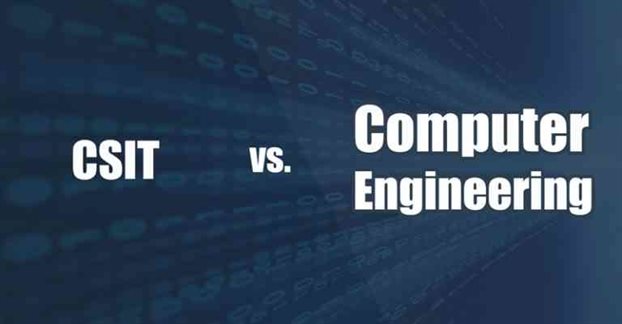Computer Engineering vs CSIT, Which One is Better?
13th December 2020, Kathmandu
Computer Engineering vs CSIT: What would you choose as your profession
What would be the better profession to have between CSIT and Computer Engineering? A very hot debate amongst many Nepalese Computer interested students. Both are equally updated and identical, that the faculty of each student can have the same profession. However, to have an engineering degree and be called an engineer that students must need to have a Computer Engineering degree rather than other IT degrees such as CSIT, BIT, etc. Since CSIT is mostly software oriented course as if somebody is interested in studying programming, networking, etc CSIT is the best profession for them but if the student has a passion for robotics then Computer Engineering is for them because hardware components are broadly covered within Computer Engineering. To give a better short explanation and definition; CSIT is mainly the study of working of computer software and applications however Computer Engineering is the study of computer, its design and implementation.
Here are the few points that I have enlisted that what difference does CSIT and Computer Engineering have and what it means to be a CS student.
Firstly, each of them has its own pros and cons. I’ll strive to list these out for you so that you can make a knowledgeable decision by yourself.
CSIT(Computer Science and Information Technology):
Pros:
- CSIT is an up to date course and regularly change the curriculum. But this course solely depends on the institution, there are different curriculum on different institutions.
- CSIT is more of a practical study that helps students to have a better profession.
- CSIT students can have the freedom to select elective subjects during their sixth and other remaining semesters.
- There is plenty of professions that students can choose like programming, networking, data mining. Offensive Security, etc.
Cons:
- CSIT students can’t allow to call themselves an engineer.
- In Nepalese society, even if you’re skilled you will always be less than an engineering student. Remember I said Nepalese society not work society.
- More expensive and has no clear path to a scholarship.
- Not sufficient study resources available in the market.
Computer Engineering:
Before I start I am a CSIT student and the points that I’m listing are the reviews from my engineer friends that had gone through during their academic period. Lets us begin.
Pros:
- To begin with, students having an engineering degree can call themselves an engineer.
- The government has invested a big amount of money into Computer Engineering rather than CSIT and other IT degrees. So they have better job opportunities.
- If you get into Pulchowk, you get to learn about challenging and clever classmates.
- Computer Engineering is primarily targeted on hardware, so students having a mindset in robotics is better to study engineering rather than CSIT.
Cons:
- I always choose practicality rather than theoretical. But Computer Engineering is more theoretical than practical.
- Its course is totally outdated at least for TU.
- Students have to study unrelated subjects like chemistry, etc.
- The course seems to be designed by electronics engineers so not realistic for programming fields.
From above you know what makes them apart and at the same time identical. If the students have interest on robotics and cybersecurity, each faculty have their own flaws like if you are interested on offensive security both degree will help you to become better. In cybersecurity & robotics, you need to familiar with both hardware and software if you are good at only one of those these you can’t become better and your productivity will be quite disappointed. Just say you are going to develop a robot you know only about hardware but you can’t make a good secure network for that robot your work will go like water under the bridge. Same with making a good network you need compatible hardware. I don’t imply that the similarity between them but what they have in common is that they need each other to make better productivity.
Before I end this I would just like to say to all the students who want to study computer for further education give some thoughts about what you wanted to be and then choose your profession wisely.







